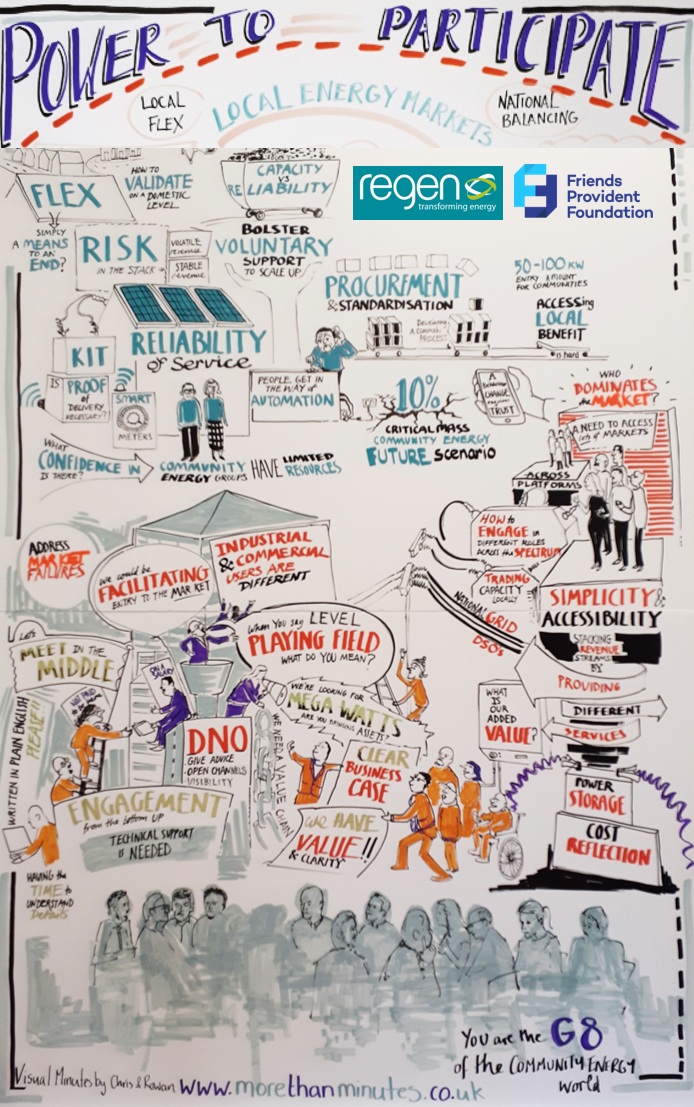
Our energy system is undergoing radical change. Long-established patterns of demand are being disrupted by smart technologies like heat pumps and electric vehicles while renewable energy generation has increased variability of supply. Both these factors are increasing the need for our electricity system to be flexible.
Today, Regen published a major new report that sets out 13 key reasons why community and local energy organisations, widely seen as a valuable potential provider of flexibility services, are not playing a more active role in this market – and what we can do about it. The report is culmination of Regen’s Power to Participate project funded by Friends Provident Foundation.
Regen spent several months engaging with community energy organisations and most of the GB Distribution System Operators (DSOs), discussing flexibility services in detail. For many community and local energy organisations, supplying flexibility to the network has too many barriers:
- The value of providing flexibility is too low
- It is not clear how the current flexibility opportunities help unlock more low carbon generation
- Contract lengths are too short
- Understanding how the revenues stack is still too complex
Regen is calling on DSOs, the Electricity System Operator (ESO), Ofgem and government to be proactive when building the new markets that will shape the energy system of the future – ensuring an inclusive market that empowers smaller organisations to play a valuable role. Specifically, we are calling for them to;
Provide a genuine ‘level playing field’
DSOs must recognise that a level playing field for the flexibility services market does not mean treating everyone the same. If community energy organisations are to engage they will need additional support. If a DSO’s standard terms and conditions are unrealistic for smaller organisations to comply with, they are effectively being excluded. The work towards a clear set of agreed T&Cs across the industry would be a good step forward.

Address practical barriers
Community energy organisations are cautious about providing flexibility services as the barriers they encounter are formidable: contract lengths are too short, metering requirements are onerous and the financial returns are too low.
Longer contracts, at least at the early stages of flexibility markets, are key to enabling investment. Help with addressing metering requirements is also important, in particular not insisting on minute by minute metering when half hour metering would do.
Making the process for selling flexibility simpler and less resource intensive would help address the financial barriers. Last week, Piclo released details of flexibility competitions past and present, including locations and pricing. This is a helpful step in helping community energy organisations understanding flexibility markets but much more should be done to streamline the procurement process.
Explain how flexibility services unlock progress to a low carbon system
DSOs are buying flexibility services in certain places to help defer investment in network upgrades. This may well save customers money on their bills but does not establish any kind of link with the things community energy organisations are focused on; unlocking more generation projects or lowering electricity demand in their local area. Given that supplying flexibility services results in relatively low returns, there must be other reasons why community energy organisations would engage. Deferment of investment by a local DSO is not one of them.
DSOs must explain how buying flexibility services in constrained areas will play a role in unlocking more capacity in the future, such as preparing the ground for peer to peer trading or smart local energy markets.
Simply buying flexibility services according to the existing rules will result in the same handful of companies delivering them, stifling innovation and stymieing competition. A level playing field is not much use if only a few players can reach it. By enabling community energy organisations to participate in flexibility services, a new approach to buying smarter solutions can be built, delivering a more democratic, decentralised and decarbonised energy system.
More fundamentally, in a climate emergency, is it is time to rethink the ‘technology neutrality’ principle that Ofgem hold so dear? It would be hard to explain to the millions on ‘climate strike’ last week why we are buying flexibility services from fossil fuel generators when they can be provided by low carbon sources such as batteries co-located with renewable generation.


 Regen’s senior project manager,
Regen’s senior project manager,